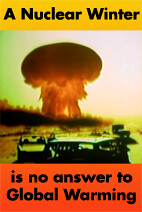When is a catastrophe not a catastrophe?
When it is only a 'change'.
It is very important to be clear in the language we use to talk about global warming.
Steven Poole, author of Unspeak, refers to strings of words such as 'collateral damage', and 'climate change' as attempts to persuade by stealth – or 'unspeak'. He took apart how the term 'climate change' came to supplant 'global warming' to refer to the changes to our environment caused by human produced greenhouse gasses.
This was done with the express purposes of softening the sense of threat in 'global warming'. Poole argues that a decade ago the US began their push for the language switch to 'climate change' because 'global warming' is too alarming - too threatening to their interests in coal, oil and industry.
Poole told a forum on language at the Sydney Writers Festival in May:
America and Saudi Arabia and other countries, lobbied to replace the phrase 'global warming' with 'climate change' in the early 90s in the UN because they knew that 'global warming' sounded too frightening, and it sounded like maybe burning oil maybe was to blame. 'Climate change' sounds very vague, it might be a good change, it doesn't have to be a bad change. We know that Frank Luntz, a pollster who works for the Republicans, reminded them ten years later, 'We have to say 'climate change' instead of 'global warming' because 'global warming' is too alarming, too emotional, and we had a focus group about this and one lady said that climate change sounds like you're moving to Fort Lauderdale.'Arguments about how our language twists and veils what is really happening aren't new: George Orwell explored it, and Don Watson (wry, as usual, at the same Sydney forum Poole spoke at) has looked at how managerial language has invaded our public sphere.
I have made it a deliberate practice to refer to global warming, rather than climate change, here in this blog, in my conversations with people and when I visit and comment on other blogs.
I think it's very important. We aren't talking about lovely summer weather at the beach, here. Deliberate obfuscation must be met with deliberate clarity in our words and meaning.
ABC Radio National's Bookshow broadcast that forum in June. Unfortunately, the podcast I first heard is no longer online. However, you can find the broadcast transcript of that excellent forum here.










0 Comments:
Post a Comment
<< Home